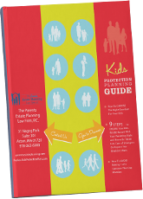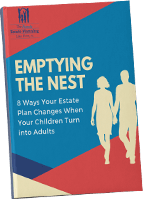
Sometimes, something that looks simple or easy at first glance, can turn out to be quite complicated and much, much more difficult. Estate planning is one such thing. Search online, and you’ll find tons of online do-it-yourself estate planning services. On social media, you’re probably seeing ads for products such as Will & Trust, Legal Zoom, or Suze Orman’s estate planning kit. Such forms are typically inexpensive. Simple Wills, for example, are often priced under $100, and you can complete and print them out in a matter of minutes.
Now that our whole world, it seems, is operating almost entirely online, it’s no surprise that creating an estate plan this way might seem like a good idea. You know estate planning is important, and even though you may not be getting the highest quality plan, you feel better having done something. But in this case, something may not be better than having nothing at all.
There are hidden complications in do-it-yourself estate planning that will make things a lot less simple, for you, and for those you love. (Just read a few of the comments on a recent ad, pictured here!) This is one case in which something is not better than nothing, and here’s why:
A FALSE SENSE OF SECURITY
Creating a DIY Will online may lead you to believe that you no longer have to worry about estate planning. After all, you got it done, right?
Except that you didn’t. Because you’re not a legal expert, you understandably thought you “got it done” because you went online, printed a form, and had it notarized. But, you didn’t investigate what would actually happen with that document in place in the event of your incapacity or when you die. Unfortunately, in the end, what seemed like a bargain could end up costing your family more money and heartache than if you’d never gotten around to doing anything at all.
Creating a DIY Will can lead you to believe that you no longer have to worry about estate planning. In the back of your mind, you might even promise that one day you’ll revisit and update your plan with something better, but chances are, having done “something” will lead you to put this off until it’s too late.
IT’S NOT JUST ABOUT FILLING OUT FORMS
Unfortunately, because many people don’t understand that estate planning entails much more than just filling out legal forms, they end up making serious mistakes with DIY plans. Worst of all, these mistakes are only discovered when you become incapacitated or die, and it’s too late. Then it’s not bad for you, it’s bad for everyone else in your life. Online forms are also cookie-cutter and don’t take into account your unique family make-up or situation. Sadly, the people left to deal with your mistakes and oversights are often the very ones you were trying to do right by.
The primary purpose of Wills and other estate planning tools is to keep your family out of court and out of conflict in the event of your death or incapacity. With the growing popularity of DIY Wills and increasingly non-traditional families, tens of thousands of families (and millions more to come) have learned the hard way that trying to handle estate planning alone can not only fail to fulfill this purpose, but it can also make the court cases and conflicts far worse and more expensive.
THE HIDDEN DANGERS OF DIY WILLS
From the specific state you live in and the wording of the document, to the required formalities for how it must be signed and witnessed, there are numerous potential dangers involved with DIY Wills and other estate planning documents. Estate planning is most definitely not a one-size-fits-all deal. Even if you think you have a simple situation, if you have children, that’s almost never the case.
The following scenarios are just a few of the most common complications that can result from attempting to go it alone with a DIY Will:
Improper execution: For a Will to be valid, it must be executed (i.e. signed and witnessed or notarized) following strict legal procedures. Such procedural requirements are designed to prevent foul play and vary by state. For example, many states require that you and every witness to your Will must sign it in the presence of one another (in Massachusetts right now a remote notarization bill is enacted which allows you to do this over video conference, if certain circumstances are met.) If your DIY Will doesn’t mention that or you don’t read the fine print and fail to follow this procedure, it can be worthless.
Court challenges: Before the assets covered in a Will can be transferred to your heirs, the Will must go through the court process called probate. During probate, creditors, heirs, and other interested parties have the opportunity to contest your Will or make claims against your estate. Though Wills created with an attorney’s guidance can also be contested, DIY Wills are not only far more likely to be challenged, but the chances of those challenges being successful are much greater than if you have an attorney-drafted Will.
Thinking a Will is enough: It is almost never the case that a Will alone is sufficient to handle all of your legal affairs. In the event of your incapacity, you would also need a health care directive and/or a Living Will, plus a durable financial power of attorney. In the event of your death, a Will does nothing to keep your loved ones out of court. And if you have minor children, having “just a Will”could leave your kids’ at risk of being taken out of your home and into the care of strangers. Even if only temporarily, this can be a traumatic experience for your child.
In many ways, DIY planning is the worst choice you can make for the people you love because you think you’ve got it covered when you most certainly do not.
If you’ve yet to do any estate planning at all, have DIY documents you aren’t sure about, or if you have a plan created with another lawyer’s help but it hasn’t been updated or reviewed in more than a few years, you should meet with an experienced Estate Planning attorney. Our team is dedicated to ensuring that your family will be kept out of court and out of conflict if something should happen to you. Contact us today to learn more.












